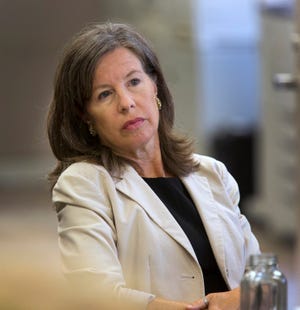After years of rival parties controlling the Hamilton County government and Cincinnati City Hall, one might think that the relationship is much better now with one party running the Board of Commissioners and the Mayor’s Office.
Not as much.
In fact, city-county relations could be worse than ever, some longtime local political watchers told Politics Extra this week.
Commissioners Denise Driehaus and Todd Portune and mayor John Cranley – All of the long-known Establishment Democrats disagreed on several important issues. These include: controlling the Metropolitan Sewer District, water prices, building a riverside music venue, and repairing public transportation.
You reached an agreement on the music venue this week, ending a month-long dispute. But it’s hardly a sign that things are getting any better, especially after the commissioners ticked off the mayor on Monday.
Driehaus and Portune held a surprise press conference to introduce a new plan for MSD surgery without first notifying Cranley or city officials. It sparked a sharp response from Cranley, who said, “The county should avoid us.”
All of this must involve more than basic political disagreement. I’ve been trying to figure out what the hell is going on all week. Here’s what I learned:
• Portune and Driehaus see themselves mainly as lawyers for the parts of the county outside the city limits. That approach has created a rift between us and them, some say even though the city is part of the county.
• Cranley and Portune have had a love-hate relationship for nearly two decades, a personality conflict that has not mattered for all the years Portune was in the minority. But their power struggle has come to the fore in local politics, perhaps a manifestation of a relationship that didn’t start well in 2000.
Cranley rejected the idea that a personality conflict exacerbated the differences between town and county.
“It’s a major disagreement,” said the mayor. “I’m not against Denise or I’m against Todd. We (Cranley and Portune) got off to a rocky start years ago. I’m not as close to him as I am to Denise. I consider Denise a friend. But Todd and I have in many worked well together on various issues. “
Portune declined an interview request.
In December 2000, Portune left the city council after being elected commissioner. The mayor at the time Charlie hatches and other Council Democrats wanted Cranley appointed to fill Portunes’ seat. Although it wasn’t his choice, Portune opposed the 26-year-old political freshman who received the appointment. Portune wanted instead Scott Seidewitzwho finished 12th in the 1999 Council race.
It resulted in a lot of hand pressing. From an Enquirer editorial from December 2000:
“Mr Portune decided to postpone his resignation, particularly after the Mayor and others wanted Mr Cranley to stay on the nomination list. Mr Portune ran for the county commissioner on a promise of ‘cure’ and said he would go to the ‘war of words “end” between the city and the district. But the bridge builder looks more like a bridge burner and spends his final days giving advice with the same mayor and democratic council members with whom he can harmonize as district commissioner. It’s not a good start. “
Cranley got the place. He initially agreed to keep Portune’s aide, Larry Frazier, in the office. After Cranley was re-elected in 2001, he dismissed Frazier. Cranley replaced the African American employee with the council high school buddy. Frazier filed a discrimination complaint against Cranley with the Ohio Civil Rights Commission. In 2003 Portune attended the Columbus Commission hearing to support Frazier.
The appeal was ultimately dismissed.
Cranley and Portune have had their ups and downs since then. In fairness they worked well together at times. For example, they got together a decade ago to restructure the SORTA board and give it a stronger regional representation.
After Cranley was elected mayor in 2013, he and Portune were able to keep their differences behind the curtain as the GOP still controlled the Board of Commissioners. That changed in 2016 when Driehaus was elected. Democrats are now holding all three seats Stephanie Dumas was elected last year.
Nobody should question Cranley and Portune’s passion for what they do. You are both well-meaning officials. But even without their history, they have the types of personalities that can be a headache when negotiating.
Cranley’s pragmatism as a politician in pursuit of achievement is sometimes refuted by an aggressive and heated phase. His advisors have asked him to rest. In January, the mayor, office staff and political team retired for a day. The recurring theme: Finding friends, not enemies, Mr. Mayor.
Portune is persistent and lengthy. He’s so lost in the details that it can affect his ability to get big things done.
However, it has been proven that city and county democrats can work together. Early 2007 afterwards David PepperThe election gave the Democrats a majority in the commission, he and Portune worked with the then mayor Mark Mallory to start the Banks project.
Driehaus, the President of the Commission, is confident that the leaders of the county and the city can achieve this kind of cooperation again.
“We have to make these relationships work,” said Driehaus. “It can be a challenge, but that’s no reason not to try.”
Listen to Jason’s That’s So Cincinnati podcast on iTunes. Email: [email protected]



Comments are closed.